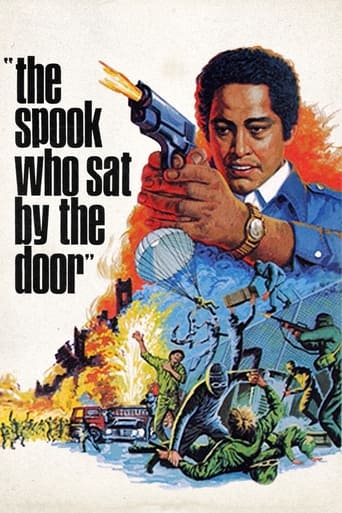frankenbenz
I'll always remember Ivan Dixon as "Kinch" on my favorite after school TV show growing up: Hogan's Heroes. Despite the show making Dixon a household name, he walked away from it (the only cast original cast member to do so), a decision motivated by his lack of creative fulfillment. In Dixon's mind, playing a token black on a silly sit-com was wasted time, an unwelcome departure from his serious work as a stage actor and second fiddle to Sydney Poitier in films like Porgy and Bess and A Raisin in the Sun. In addition to Dixon's creative integrity he also had ambition, a trait white Hollywood afforded very few blacks.With Gordon Park's blaxploitation masterpiece Shaft tearing up the box-office, Dixon seized the opportunity to direct by helming Trouble Man, itself a prototypical blaxploitation pic. A year later Dixon used his momentum to get back behind the lens to direct Sam Greenlee's underground hit novel The Spook Who Sat by the Door. With Spook, Dixon was able to break the chains shackling Blacks within Hollywood by bringing to the silver screen the politically taboo story of a Black revolutionary declaring war on White society. Lawrence Cook is perfectly cast as the cunning Dan Freeman who infiltrates the White power structure by gaining entrance to the CIA before quitting to form a inner-city Chicago leftist group of revolutionaries. If art imitates life, then you have to consider what it took for a Black director to not only get a film like TSWSBTD financed, but to get White Hollywood to distribute it. While the film itself is sloppily and artlessly made, it remains important because of both its content and the fact that a film with such an anti-social message would even see the light of day during the political climate of the conservative Nixon administration. If he wasn't already on it, it's a safe bet Dixon was on Nixon's black list after Spook was released.Dixon's career as a feature film director practically stalled after Spook, but he went on to direct some of the best TV in the 70's and 80's, most notably on The Rockford Files and Magnum, P.I.. One could speculate his opportunities to continue directing controversial feature films was curtailed by the forces that be --which would make for an interesting theory-- but after seeing Spook it is safe to say Dixon's talents were simply better suited for the small screen. Nevertheless, The Spook Who Sat by the Door is required viewing for every student of African-American Cinema.http://eattheblinds.blogspot.com/
fox_orvngs
This is one of the undiscovered treasures of cinema people, if you haven't seen it you need to. They never paid for one permit and they did this movie for about $90,000USD, but they don't skip a beat. Same editor as Schindler's List; if you watch the movie you can tell why Spielberg uses this guy, he is a master.Even if you don't agree with the films message you have to agree that this is one of thee finest made independent films in existence, and considering the subject matter it is a surprise this film was ever shot, because the book had a pretty hard time getting published too.I think this film is everything Melvin Van Peebles wanted SweetBack to be.
Baroque
Dan Freeman (played by Lawrence Cook) is a token black CIA operative. Trained in all sorts of espionage, he is relegated to working in the copying department as a "showcase" employee of integration. As the title suggests, he's placed by the door of the office so he's the first person everyone sees. Incensed by his mistreatment (and the racial stereotyping of his superiors), he resigns to his native Chicago as a social services worker.Secretly, he is training a street gang into a guerrilla army to be the vanguard in a race war, using all of his training by "the man" against "the man".The details are impressive. Freeman explains how to establish a hierarchy in an underground movement, how to recruit new members, living on the street, and forming new cells. He also details how racial stereotypes can be used to one's advantage, citing how no one ever notices a smiling black man in an office carrying a mop.The film is a faithful adaptation of Sam Greenlee's controversial novel of the same title, and a haunting look at what MIGHT have (and maybe damned near) happened in the USA during that turbulent period of history. The film was quickly followed by a long line of "blaxploitation" films, often made with little regard for content and style. But "Spook", shot on a small budget, has a powerful message: Never underestimate anyone! Not even "the spook who sat by the door"!As a motion picture, it does have technical weaknesses, but the drama is well-played, the plot is very tight and the characters are believable. The language, however, is very harsh. A white man (like myself) may find the diatribes against "whitey" shocking, but this film was made during a time of great racial strife, and it echos those times.Made in 1973, it still packs a punch, and is worth tracking down and buying (Do a web-search! That's how I got my copy!).A ground-breaking film! (Does anyone but me catch the irony of the main character's name? "Free Man"?)
BookerII
I viewed this film in a Pan African Studies class at California State University, Northridge in 1993. Professor James Dennis who was a Civil Rights activist who made the Mississippi Freedom Rides told us this was the best film about and by African-Americans, and I agree with him wholeheartedly! I would like to get this video and show it in the classes I teach in history. This film was ahead of its time. Sam Greenelee is a very good writer and captures the essence of the struggle for African-Americans.





